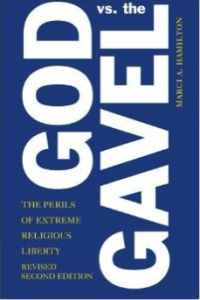October 1, 2014
Private: God vs. the Gavel: The Perils of Extreme Religious Liberty
Burwell v. Hobby Lobby, Religious Freedom Restoration Act

by Marci A. Hamilton, the Paul R. Verkuil Chair in Public Law at the Benjamin N. Cardozo School of Law, Yeshiva University.
*This post originally appeared on Hamilton and Griffin on Rights.
How do you talk about the unspeakable? A decade ago, it was taboo to criticize religion or religious believers in print. They were a benign presence in America right next to apple pie. I wrote God vs. the Gavel: Religion and the Rule of Law then to defeat this taboo, because it was masking a reality most Americans would want to know.
There I stacked up transgressions of religious actors, including the sexual abuse and medical neglect (to death) of children, the forced marriage of adolescents into polygamous marriages, the violence of white supremacist or radical jihadist prison gangs, and even the questionable dealings of religious developers who forced incompatible uses like homeless shelters into residential neighborhoods. It was all for religion, with results that were not so benign.
The destruction of the taboo was necessary in a just society. The perpetrators of 9/11 were religious zealots. So were the parents who let their children die. Roman Catholic bishops covered up for child abusers and endangered one child after another to protect the religious institution from scandal. Then the same pattern appeared across virtually all religious denominations. These were atrocities.
Before these criminal acts reminded us of the power of religion to be both transcendent and horrible, Congress had ratcheted up the rights of religious believers by passing the misbegotten Religious Freedom Restoration Act (RFRA) in 1993 and 2000. Hardly anyone understood what it meant either time and no one was thinking of jihadists, clergy child predators, or children dying from medical neglect, in part because mainstream religious lobbyists intentionally presented a wholesome face to Congress, arguing that religious believers faced discrimination across the country that needed to be corrected by the statute.
What could possibly be wrong with “restoring” religious freedom? A lot, when it is not an actual restoration but rather a new concoction that handed believers rights to avoid the law that they never had before.
Then RFRA metastasized as religious lobbyists demanded the enactment of state RFRAs, with the argument that if it was good for the federal government, it was good for the states. Nineteen states have followed suit, and lobbyists are still pushing in the rest.
I wrote God vs. the Gavel: The Perils of Extreme Religious Liberty, to unmask RFRA for what it is and to explain to the American public what it desperately needs to know: the opaque, legalistic mumbo jumbo of RFRA and the culture it has generated carve out a pathway to child abuse and neglect, discrimination, and tyranny. The Burwell v. Hobby Lobby case and decision were shocking to many Americans, but not to me. It is only one example of what happens when we give religious actors extreme rights.
My goal with The Perils of Extreme Religious Liberty is to educate as many as possible about the perils of extreme religious liberty, the need to fight for the protection of the vulnerable, and the wisdom of repealing the RFRAs. Even religious liberty needs to be leavened with common sense.




